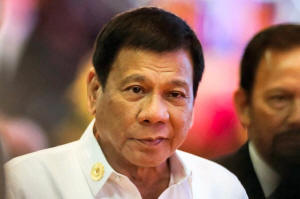|
Philippines' Duterte says China, Russia
supportive when he complained of U.S
 Send a link to a friend
Send a link to a friend
 [October 03, 2016]
MANILA (Reuters) - Philippines
President Rodrigo Duterte said on Sunday he had received support from
Russia and China when he complained to them about the United States, in
another broadside that could test his increasingly fragile alliance with
Washington. [October 03, 2016]
MANILA (Reuters) - Philippines
President Rodrigo Duterte said on Sunday he had received support from
Russia and China when he complained to them about the United States, in
another broadside that could test his increasingly fragile alliance with
Washington.
Duterte said that during a meeting on the sidelines of a leaders' summit
in Laos last month, Russian Prime Minister Dmitry Medvedev had agreed
with him when he railed against the United States.
"I met with Medvedev, I am revealing it to you now," Duterte said in a
speech. "I told him this is the situation: They are giving me a hard
time, they are disrespecting me; they are shameless.
"He said: 'That is really how the Americans are.' He said: 'We will help
you.'"
Duterte gave no further details about the nature of his complaints.
His ire toward the United States has intensified since U.S. President
Barack Obama said he would raise concerns about Duterte's deadly war on
drugs.
The White House canceled a meeting between them in Laos after Duterte
had called Obama a "son of a bitch."
Duterte said on Sunday he had raised objections about the United States
to China also.
China said the Philippines would not benefit from siding with the United
States, according to Duterte. It was not immediately clear which Chinese
official he was quoting and when the remark was made.

Duterte has said repeatedly during recent, frequent speeches that he
planned to open new alliances with Russia and China, particularly for
trade and commerce, as part of his pursuit of an independent foreign
policy.
Several commercial and diplomatic sources have confirmed to Reuters that
a Philippine business delegation will accompany Duterte on a visit to
Beijing from Oct. 19-21.
DOUBTS OVER DEAL
In another swipe at Washington, Duterte said he would review a landmark
security deal agreed upon with the United States, arguing it may not be
legally binding because no president had signed off on it.
Duterte's remarks show his intent to challenge or test the limits of a
historic alliance that U.S. Defense Secretary Ash Carter on Thursday
called "ironclad."
That came the day after Duterte declared joint U.S.-Philippines war
games starting this week would be "the last."
The Enhanced Defence Cooperation Agreement, signed a few days before
Obama visited the Philippines in 2014, allows U.S. troops to build
storage facilities for maritime security and humanitarian and disaster
response operations.
It also provides broad access to Philippine military bases.
Duterte said the agreement would be reviewed because it was signed by
the then Philippine defense secretary and the U.S. ambassador, and not
the country's president.
Duterte did not explicitly say that he would try to scrap the deal, but
in comments aimed at the United States, he said: "It does not bear the
signature of the president of the Republic of the Philippines ...
[to top of second column] |

Philippines President Rodrigo Duterte leaves the opening ceremony of
the ASEAN Summit in Vientiane, Laos September 6, 2016. REUTERS/Jorge
Silva

"Better think twice now, because I would be asking you to leave the
Philippines altogether."
In a response, the Pentagon said the United States and Philippines
had a long history of working together on security issues and that
conversations between Carter and his Philippine counterpart last
week in Hawaii had been "positive."
"We will continue to honor our alliance commitments, and we expect
the Philippines to do the same," said Pentagon spokesman Peter Cook.
"We will continue to work closely with the government of the
Philippines to address any concerns they may have," Cook said.
Under the defense agreement, two C-130 transport planes and 100 U.S.
servicemen have been at an air base in the central Philippines since
Sept. 25 as part of a two-week exercise.
Analysts saw the agreement in part as a deterrent to ward off moves
by China to advance its interests in the South China Sea.
Chairman of the U.S. Senate Committee on Armed Services, John
McCain, has previously said the agreement was a landmark deal with a
significance "not witnessed in decades."
Any indication it could be halted would be a big setback for U.S.
efforts to boost its influence in Asia and counter that of a
fast-rising China.
Washington's defense agreements with the Philippines, its former
colony, are more substantial than with any other country in
Southeast Asia.
Duterte's comments come at a time when U.S. defense ties with
Thailand, another traditional ally, have been temporarily scaled
back following the military's 2014 coup.
The defense deal with the Philippines faced a legal challenge from
some of the Asian country's lawmakers and activists. They were
concerned that it represented a challenge to sovereignty and would
make the Philippines a launching pad for U.S. military intervention
in the region.

The Supreme Court ruled in January that it was constitutional.
(Additional reporting by Roberta Rampton; Writing by Martin Petty;
Editing by Mike Collett-White and Lisa Von Ahn)
[© 2016 Thomson Reuters. All rights
reserved.]
Copyright 2016 Reuters. All rights reserved. This material may not be published,
broadcast, rewritten or redistributed. |